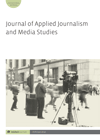
Full text loading...
 , Javad Alipoor2
, Javad Alipoor2 , Mehran Samadi1
, Mehran Samadi1 , Neda Soleimani1
, Neda Soleimani1
The great powers utilized media as a tool of political communication and propaganda after the First World War. The leading role of propaganda during the Second World War enabled them to use media and develop media policy. The United Kingdom, as a pioneer of political communication, used the British Broadcasting Corporation (BBC) in order to influence public opinion. The BBC has developed since its inception and now plays an inimitable role in the UK media policy and diplomacy. This article examines the British media policy including regulations, approaches, management and strategies to clarify how the United Kingdom designs and operates its media-based policies in order to play effectively in the media back grounds. It uses the documentary method to answer the questions: what are the organizational and management structures, regulations, strategies and approaches of the British media policy? And how has the British media policy been developed to surmount the media regulation problems and challenges? This research indicates that the development of a smart-organized and well-regulated system of media policy enables the United Kingdom to utilize media to promote the priorities of the British foreign policy and influence public opinion around the world as well as to play a crucial role in media wars to protect its interests in international system.

Article metrics loading...

Full text loading...
References


Data & Media loading...

Publication Date:
https://doi.org/10.1386/ajms_00065_1 Published content will be available immediately after check-out or when it is released in case of a pre-order. Please make sure to be logged in to see all available purchase options.